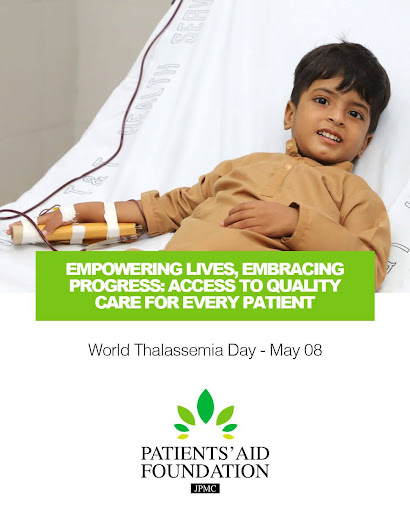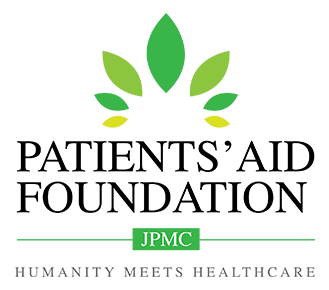Patients’ Aid Leading the Fight Against Thalassemia

Thalassemia is one of the most dangerous diseases in the world, and it urgently needs attention. While we hear about the challenges of living with thalassemia, we can never truly understand the pain of those affected. World Thalassemia Day is observed every year on May 8th to raise awareness and advocate for those in need.
Thalassemia is a manageable genetic blood disorder, yet it remains a major health issue in Pakistan, which has the highest rate of thalassemia globally. PBM research estimates that around 100,000 individuals in Pakistan live with thalassemia, with 5,000 to 9,000 new cases diagnosed annually. Despite the severity, many remain undiagnosed or diagnosed too late due to limited resources.
However, this is changing. Patients’ Aid aims to remain at the forefront of the fight against thalassemia. On this World Thalassemia Day, 2025, we are working hard to spread awareness to those who need it most.
Background of Thalassemia
The human body depends on blood to stay alive and healthy, as it transports oxygen, nutrients, and waste in and out of the body’s tissues. The human body contains approximately 5 liters of blood, which is made up of two components: plasma (the liquid portion) and various types of blood cells. These blood cells include three major types, each with a unique function:
- Red Blood Cells: These are the ones that carry oxygen. They contain a special protein called hemoglobin that binds to oxygen and delivers it to tissues throughout the body. Hemoglobin is what gives blood its red color and is essential for life.
- White Blood Cells: These act as the body’s defense system. They fight off bacteria, viruses, and anything else that might make us sick.
- Platelets: Lastly, platelets play a key role in blood clotting. They help stop bleeding whenever we get injured.
Hemoglobin itself is made of protein chains. There are two kinds: alpha and beta. These are produced by specific genes passed down from both parents. If either of these chains isn’t made properly, it can cause serious health issues.
What is Thalassemia?
Thalassemia is a genetic condition passed from parents to children, where the body struggles to make healthy hemoglobin. Without proper hemoglobin, red blood cells don’t work as they should, and put the person at high risk of developing anemia and related complications.
There are two main types of thalassemia, based on which hemoglobin chain is affected:
- Alpha Thalassemia: This happens when there’s a problem making alpha chains. It’s usually caused by changes in the alpha genes.
- Beta Thalassemia: This occurs when beta chain production is reduced or missing, due to a defect in the beta genes.
Common Symptoms of Thalassemia
Depends upon severity and type:
- Fatigue and weakness
- Dark coloured urine
- Jaundice
- Slow growth in children
- Facial bone deformities
- Abdominal swelling
- Shortness of breath
- Fast heartbeat
Thalassemia Awareness and Prevention in Pakistan
Thalassemia is one of the most common inherited blood disorders in Pakistan, where cousin marriages and a lack of awareness have contributed to a rising number of cases. It is crucial to have your partner tested for thalassemia before marriage, as if both parents are carriers of the trait, there is a 25% chance with each pregnancy that the child will be born with thalassemia major. Unfortunately, due to limited screening and low public awareness, many people remain unaware of their carrier status.
There is an urgent need for awareness campaigns, pre-marital screening, and public education to control the spread of this disease. With timely prevention strategies and community support, Pakistan can reduce the burden of thalassemia and protect future generations from its life-altering impact.
The Impact of Patients’ Aid in Enhancing JPMC’s Blood Bank
Patients’ Aid has played a vital role in revamping the blood bank at JPMC recently, which serves thousands of patients free of charge, particularly those with limited access to healthcare due to financial constraints. People from remote areas of Sindh, Balochistan, Punjab, and other underprivileged regions of Pakistan come to JPMC in search of quality treatment and a second chance at life.
JPMC’s blood bank is the third-largest in Pakistan, offering high-quality blood for transfusions. The blood bank is accessible to anyone in need, operating from 8 am to 1 am to ensure timely assistance.
Need Help? You’re Not Alone
If you or someone you know is living with thalassemia, worry no more. Visit JPMC for proper diagnosis, treatment, and access to life-saving blood.
Support Thalassemia Patients with Your Generous Donations
If you want to make a real difference, consider donating to help those who are fighting every day for their lives. This Thalassemia Day, 2025, let’s come together to ease their journey by contributing your Sadqah, Zakat, or Khairaat.
Whether your donation is big or small, what truly matters is the intention behind it, the will to give back to the community and stand with those in need.
Let’s join hands and support these brave individuals.
Click here to make your donation now with Patients’ Aid and help make quality healthcare accessible for underprivileged patients at JPMC.
FAQs:
Q.01:How is Thalassemia Treated?
Thalassemia treatment depends on how serious the condition is. In milder forms, no treatment may be needed apart from monitoring. However, in moderate to severe cases, the following treatments are common:
- Regular Blood Transfusions: Essential for patients with thalassemia major to maintain normal hemoglobin levels. Depending on the condition, transfusions may be needed every few weeks.
- Iron Chelation Therapy: Frequent transfusions can lead to iron buildup in the body. Chelation therapy helps remove excess iron and protect organs from damage.
- Folic Acid Supplements: To help the body produce red blood cells more efficiently.
- Bone Marrow or Stem Cell Transplants: In some cases, this may offer a potential cure, especially in younger patients with a suitable donor.
Q.02: How Often is Blood Needed?
For individuals with severe thalassemia, blood is a lifeline. They often need transfusions every 2 to 4 weeks throughout their lives. This high demand for safe and matching blood makes regular blood donation a crucial public health need. If you want to help these people get blood timely, consider donating to Patients’ Aid.
Q.03: How Serious is Thalassemia?
The seriousness of thalassemia varies. Some people live normal lives with little to no intervention, while others depend heavily on medical treatment and blood transfusions. The condition can also affect organ function and quality of life if left unmanaged.

